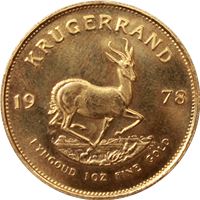Gold Krugerrand Value: Explanation and Current Price Chart
How much gold Krugerrands are worth depends on the price of gold. Any Krugerrand is worth at least its weight in gold when you sell.
On the retail market, gold Krugerrand prices are usually expressed as a "premium over spot." This means the value of a given Krugerrand is the gold spot price (i.e. the melt value of 1 troy ounce of gold) plus a premium. In most cases, the premium is about 3% to 5% above spot.
The prices for specific dates of the Krugerrand, however, don't usually vary. This is generally the same way other modern bullion coins are priced by collectors.
From 1967 to 1969, Krugerrands were made only as collector's pieces. Mass production of Krugerrands began in 1970. These coins were intended for international circulation.
The South African Mint has also issued a few thousand proof coins each year, although even these pieces may not have much of a numismatic premium. (In other words, they also tend to sell for melt value.)
Gold Krugerrand Price Chart (Key Dates Only, 1 oz Coins)
| 1967 | 40,000 | $2,500 for MS68 |
| 1967 (Proof) | 10,000 | $4,500 for MS68 |
| 1968 | 20,000 | $2,500 for MS68 |
| 1969 | 20,000 | $2,500 for MS68 |
| 1970 | 211,018 | $2,500 for MS68 |
| 1971 | 550,200 | $2,500 for MS68 |
| 1972 | 553,700 | $2,500 for MS68 |
| 1973 | 859,300 | $2,500 for MS68 |
| 1974 | 3,203,000 | $2,500 for MS68 |
| 1991 (GRC Proof) | 426 | $2,000 for MS70 |
| 1997 (Proof, 30th Anniversary Privy) | 1,663 | $3,000 for MS70 |
| 1997 (SS Proof) | 72 | $15,000 for MS70 |
For a complete list of Krugerrand values, follow the link to check the NGC Coin Explorer.
A Briefing on the Gold Krugerrand
South African gold Krugerrands became the first modern bullion coins when they were first introduced in the late 1960s. Within a decade, they were becoming the most widely traded form of gold for private ownership and held a vast majority share of the bullion coin market for a long time. However, this changed during the heart of the 1980s.
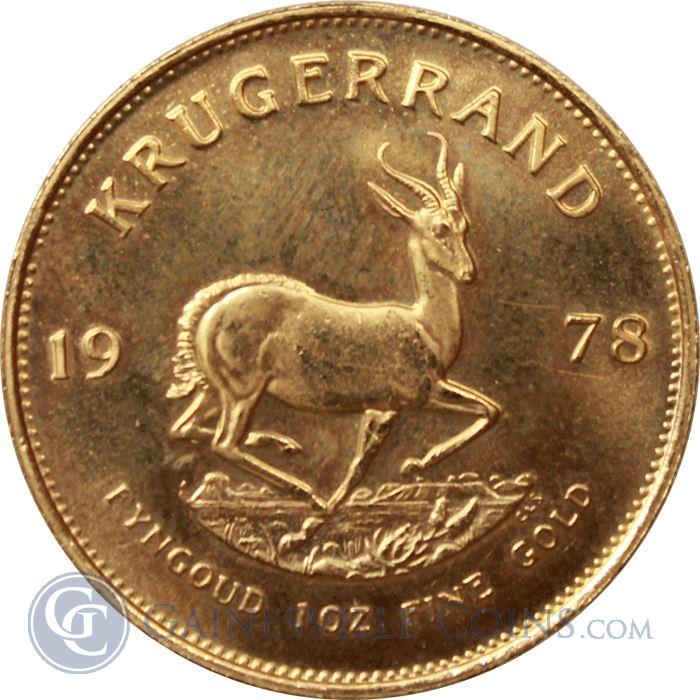
1978 Krugerrand gold coin (reverse design)
That’s when international embargoes and economic sanctions were placed against South Africa in response to its now-abandoned system of racial segregation known as apartheid. Gold buyers and private investors in other countries were not allowed to buy Krugerrands through their Gold IRA, for instance.
This wasn’t the only reason the South African Krugerrand lost its market share. In response to these embargoes, other nations began creating their own bullion programs to satisfy the demand for investment-level precious-metals coinage. Still, the Krugerrand remains a popular investment vehicle that offers speculators and collectors alike many tremendous opportunities for long-term gains and timeless enjoyment.
The Krugerrand was first minted on July 3, 1967, to sell South African gold to investors and collectors worldwide. Rand Refinery supplies the gold, and the Krugerrand is produced by the South African Mint, which is the only entity in the world authorized by the South African Reserve Bank to strike the Krugerrand and other South African legal-tender coins.
Although they carry legal tender status in South Africa, Krugerrands have no face value as money. Instead they are valued based on their precious metal content (melt value).
Interestingly, the name of the Krugerrand is a portmanteau of former President of the South African Republic Paul Kruger (who appears on the obverse, designed by Otto Schultz) and the country's unit of currency known as the South African rand. The reverse shows a prancing or "pronking" springbok (designed by Coert Steynberg), a type of antelope that is widely distributed throughout the southern African continent. The springbok antelope is one of the national symbols of the South African government.
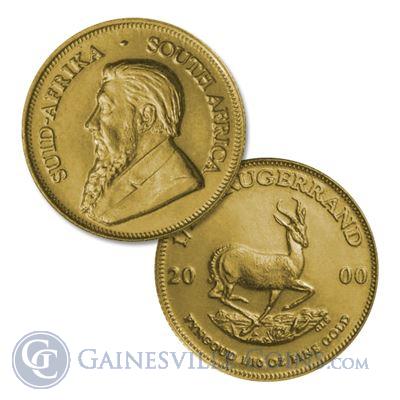
1/10 oz Gold Krugerrands. Fractional sizes were introduced in 1980.
How to Determine Gold Krugerrand Values
How much any given South African gold Krugerrand is worth can be quite erratic all over the board. This owes to the short-term volatility of the gold bullion market. It would be impractical to list fixed prices for South African gold Krugerrands here as the quoted prices would already be out of date before this article was even published. So, how do you find the current gold Krugerrand values?
One way to find out what gold Krugerrands are worth is to contact a reputable bullion dealer, such as Gainesville Coins. The experts at Gainesville Coins keep their fingers on the pulse of the fast-moving gold Krugerrand market every day and can provide you with up-to-the-moment Krugerrand spot prices, which fluctuate in value from one moment to the next.
Check the product details for prices on South African Gold Krugerrand coins (Random Year) for sale below:
Find current prices of all gold Krugerrands for sale at Gainesville Coins
For more information on gold Krugerrand values, contact Gainesville Coins today. Please call us during normal business hours at (813) 482-9300 if you have any questions before you buy gold Krugerrands.
Types of Krugerrands
There are four sizes of gold Krugerrands, and these come in two strike formats—bullion and proof. Let’s look at these different types of Krugerrands in greater detail below.
Four Sizes of Gold Krugerrands
The South African Mint produces four different types of Krugerrands, each representing different amounts of gold content. However all types are struck from 22 carat gold (.917 fine gold).
1 Oz. – Since the inception of the gold Krugerrand program in 1967, the 1 troy oz gold Krugerrand has been a mainstay. Until 1980, the one-ounce issue was the only kind of gold Krugerrand available, and it is made from a 91.67% gold composition, or 22 karat gold. The balance of the metallic profile is made up of 8.33% copper, which adds to the coin’s physical durability. Each of the 1oz gold coins measures 32.77 mm in diameter, 2.84 mm thick, and has a gross weight of 33.93 grams.
1/2 Oz. – In 1980, the South African Mint began striking fractional Krugerrands in sizes smaller than one troy ounce. This allowed more people who may not be able to afford the cost of buying one full ounce of pure gold to purchase a form of the highly popular and trusted Krugerrand. The 1/2-ounce size has generally been made in smaller quantities than its one-ounce counterpart and was struck only in proof in some years.
1/4 Oz. – The 1/4-ounce gold Krugerrand premiered in 1980 alongside its larger half-ounce fractional counterpart. In some respects, the 1/4-ounce Krugerrand has proven more popular than the 1/2-ounce size because it sits at a much larger price point lower than the 1-ounce size as compared to the 1/2-ounce price as compared to the full ounce.
1/10 Oz. – The smallest gold Krugerrand made its original appearance in 1980 with the other fractional South African bullion coin iterations. As the smallest gold Krugerrand, it also became one of the biggest sellers, appealing to not only budget-minded investors but also becoming a favorite holiday gift for those who wanted to give a truly “golden” present. During many years, the 1/10-ounce gold Krugerrand coins boasted the largest or second-largest mintage for any Krugerrand offering during any given year of production.
Bullion Gold Krugerrands
The base-level gold Krugerrand is marketed with a “bullion” finish. These pieces are struck with what might be described as an “uncirculated” finish. If one has any doubt about telling apart a “bullion” specimen of the gold Krugerrand from the proof, they need only count the number of reeds on the edge of the coin. The edge of a bullion gold Krugerrand contains 160 reeds. (The South African Mint lists 180 reeds, but most observers only count 160 reeds.)
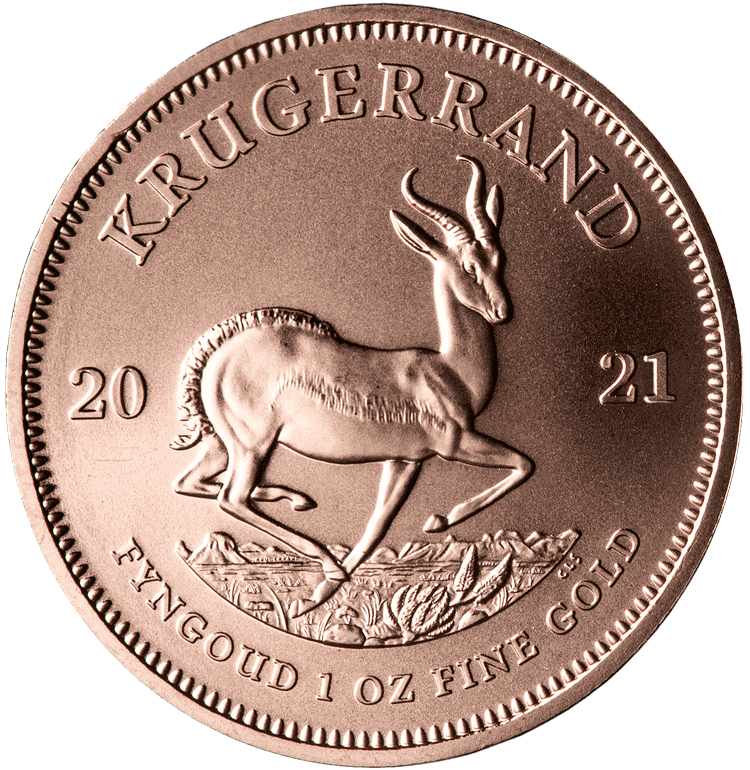
2021 Gold Krugerrand
During the bulk of the program’s existence, the number of bullion specimens struck has been significantly higher than the number of proofs in any specific year. Bullion gold Krugerrands are primarily marketed toward precious-metals investors due to their relatively lower premiums, gram for gram of gold, than the values of the proof versions, which generally sell for sizable numismatic premiums over the current gold spot price.
Proof Gold Krugerrands
Proof gold Krugerrands have been struck since the bullion program kicked off in 1967 and exhibits the epitome of quality and strike for this iconic coin. Proofs can be distinguished from their bullion counterparts by counting the number of reeds on the coin's edge; proofs sport 220 reeds—much higher than the 160 reeds on bullion Krugerrands.
Over the decades, the South African Mint traditionally struck a much smaller number of proof coins than the output of bullion pieces. This was mainly due to the greater demand for the bullion version of the coin. However, in more recent years, the South African Krugerrand has become just about every bit as much a numismatic status symbol as it is a practical store of gold bullion. As a result, mintages for proofs have in some cases been higher than for bullion strikes. In many years, specific Krugerrand issues were produced only as proofs.
In general, however, Krugerrand proofs are worth more than the typical gold Krugerrand spot price.
Bullion Krugerrand Mintage Totals By Year and Size
| 1970 | 211,018 | n/a | n/a | n/a | 211,018 |
| 1971 | 550,200 | n/a | n/a | n/a | 550,200 |
| 1972 | 543,700 | n/a | n/a | n/a | 543,700 |
| 1973 | 859,300 | n/a | n/a | n/a | 859,300 |
| 1974 | 3,203,675 | n/a | n/a | n/a | 3,203,675 |
| 1975 | 4,803,925 | n/a | n/a | n/a | 4,803,925 |
| 1976 | 3,004,945 | n/a | n/a | n/a | 3,004,945 |
| 1977 | 3,331,344 | n/a | n/a | n/a | 3,331,344 |
| 1978 | 6,012,293 | n/a | n/a | n/a | 6,012,293 |
| 1979 | 4,940,755 | n/a | n/a | n/a | 4,940,755 |
| 1980 | 2,845,872 | 245,096 | 353,916 | 856,011 | 3,142,500 |
| 1981 | 3,108,968 | 257,063 | 844,737 | 1,108,331 | 3,559,517 |
| 1982 | 2,179,120 | 222,044 | 695,755 | 1,017,192 | 2,565,800 |
| 1983 | 3,169,200 | 227,435 | 545,292 | 741,222 | 3,493,363 |
| 1984 | 2,305,128 | 197,438 | 622,813 | 755,988 | 2,635,149 |
| 1985 | 609,837 | 98,783 | 354,964 | 382,137 | 786,183 |
| 1986 | 698,600 | 17,134 | 15,044 | 81,451 | 719,073 |
| 1987 | 312,177 | 10,398 | 8,806 | 53,628 | 324,940 |
| 1988 | 307,612 | 3,214 | 8,418 | 54,058 | 316,729 |
| 1989 | 308,923 | 4,254 | 6,513 | 40,875 | 316,766 |
| 1990 | 286,808 | 3,996 | 6,980 | 52,225 | 295,774 |
| 1991 | 42,334 | 2,678 | 5,815 | 44,206 | 49,547 |
| 1992 | 50,630 | 4,366 | 7,601 | 55,440 | 60,257 |
| 1993 | 163,909 | 14,156 | 19,663 | 72,477 | 183,150 |
| 1994 | 278,815 | 17,709 | 22,091 | 87,814 | 301,974 |
| 1995 | 8,285 | 17,694 | 15,459 | 43,159 | 25,313 |
| 1996 | 17,163 | 2,488 | 7,867 | 36,035 | 23,977 |
| 1997 | 12,199 | 10,746 | 12,889 | 39,664 | 24,761 |
| 1998 | 12,703 | 7,984 | 14,174 | 30,386 | 23,277 |
| 1999 | 21,845 | 23,738 | 28,671 | 50,098 | 45,892 |
| 2000 | 6,657 | 2,593 | 2,517 | 19,567 | 10,539 |
| 2001 | 33,406 | 3,337 | 5,846 | 21,938 | 38,730 |
| 2002 | 85,841 | 2,724 | 4,464 | 13,420 | 89,661 |
| 2003 | 41,995 | 2,363 | 4,279 | 7,315 | 44,978 |
| 2004 | 87,794 | 2,847 | 604 | 868 | 89,455 |
| 2005 | 27,570 | 6,338 | 8,141 | 21,560 | 34,930 |
| 2006 | 50,790 | 9,576 | 8,645 | 14,743 | 59,214 |
| 2007 | 194,451 | 11,775 | 3,890 | 8,769 | 202,188 |
| 2008 | 256,288 | 10,999 | 13,685 | 14,681 | 266,677 |
| 2009 | 731,262 | 40,071 | 37,325 | 83,181 | 768,947 |
| 2010 | 613,870 | 25,714 | 39,244 | 58,731 | 642,411 |
| 2011 | 722,938 | 32,718 | 35,025 | 79,151 | 755,968 |
| 2012 | 716,295 | 50,035 | 41,659 | 80,102 | 759,737 |
| 2013 | 833,261 | 27,613 | 29,779 | 73,059 | 861,818 |
Please note complete mintage information from the Rand Refinery and South African Mint are not currently available beyond 2013.
Krugerrand Errors and Varieties
Krugerrands are struck to exacting standards, and therefore it’s relatively difficult to locate many errors and varieties among these coins. That having been said, some exciting oddities have come out of the Krugerrand series, and those that exist can bring remarkable prices and a fair amount of collector demand, too.
One of the most notable are the underweight-proof gold Krugerrands of 2011. A small but indeterminate number of these 2011 proof gold Krugerrands have the correct overall weight but contain less gold content than they were supposed to have. The mistake is attributed to unspecified issues that changed the amount of gold in the planchets during the production process. Collectors should also always keep an eye out for the stray doubled die, off-center strike, or other garden-variety error and variety.
Collecting Gold Krugerrands
In the early 1980s, Krugerrands accounted for as much as 90% of the commercial gold bullion bought and sold worldwide. The global gold coin market for these South African coins softened as international embargoes and new bullion coin programs arose, such as the United States Mint American Eagles and Royal Canadian Mint Maple Leaf coins. As the number of bullion options from other nations has increased, many precious-metals speculators have also diversified their portfolios to include a wide variety of bullion coins.
Meanwhile, there are many coin collectors who specialize in collecting South African Krugerrands. There are plenty to pursue—hundreds when counting all the different fractional sizes and the various proof and bullion issues. Many of these collectors will assemble a type set consisting of one of the four basic types of Krugerrands. The financially well-heeled collector might set their sights on the bigger picture of collecting one each of every date in the series, with some going one step further and buying bullion and proof examples of each kind of Krugerrand from every year.
South Africa also issues bullion coins with the classic Krugerrand design in two other precious metals now: Silver Krugerrands and Platinum Krugerrands. This allows collectors of the South African coin series to diversify their investment with platinum coins and silver coins.
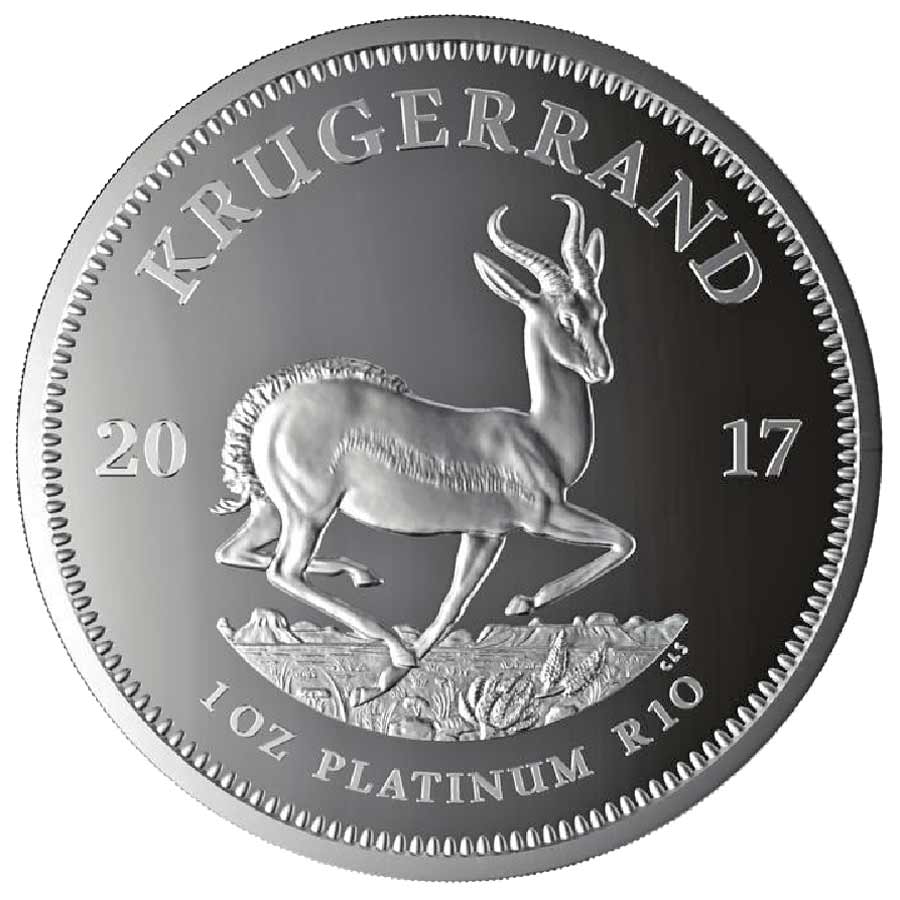
2017 Platinum Krugerrand
Frequently Asked Questions About Krugerrand Coins
Are Krugerrands worth more than gold?
Yes. Any Krugerrand that is not mutilated or otherwise defaced will always be worth more than its bullion value (i.e. its intrinsic value by gold weight). On average, this premium tends to be the gold price plus a 3%–5% premium.
Some of the Krugerrands mentioned in this article clearly have numismatic value as coins. For example, a first-year-of-issue 1967 Krugerrand can auction for double its "gold value" or actual gold weight (AGW), a 100% premium over spot.
There are other clear reasons that Krugerrand gold coins are more expensive than the gold content itself. In addition to the fabrication costs of minting, there is also a cost of storage and immediately delivery associated with physical precious metals.
How do I sell my Krugerrands?
Any place that buys gold will make you an offer for a Krugerrand. But the best place is a reputable gold coin dealer like Gainesville Coins. You can even ship to us from your home and receive payment as a check or bank wire.
Is it illegal to sell a Krugerrand? Are Krugerrands illegal in the US?
No. In the mid-1980s under President Ronald Reagan, the United States government banned the import of gold Krugerrands as a sanction against South Africa's apartheid system. This embargo also meant certain foreign coins like Krugerrands were briefly excluded from Americans' investment accounts.
Nonetheless, mere possession of these coins was not against the law—unlike, for instance, how it was outlawed for Americans to privately own any gold bullion from 1933 to the mid-1970s.
When did Krugerrands become legal?
1994, with the finalization of the end of apartheid. Once the US embargo ended, Krugerrands were also eligible for inclusion in individual retirement accounts (Gold IRAs) no matter the date of the coin (even if it was minted during the 1985–1994 era).
Can you sell Krugerrands at the bank?
Typically no in the United States. In some jurisdictions, particularly in East Asia and Central Asia, bank branches may accept Krugerrands in exchange for the local fiat currency.
Is buying Krugerrands a good investment?
They are mainly intended as a durable store of wealth over the long-term, so in this sense, absolutely. As numismatic items, Krugerrands also have potential to become more than a gold investment if demand in the gold coin market is strong.
What is the most expensive Krugerrand?
The 50th Anniversary 2017 50 oz Gold Krugerrand. It was recently valued at 2.2 million South African rand, equal to more than $140,000 (USD) at the time of writing.
The melt value alone of this coin is an impressive $92,500 based on the current gold price. Yet its value as a collectible is significantly higher because of its scarcity. Only 50 examples of the coin were minted in total, making it a modern rarity.
Does South Africa still use Krugerrands?
Because of their lack of face value, Krugerrands were never used as actual currency. While many changed hands domestically within South Africa in the course of commerce, the coins were primarily intended for export internationally to help grow the market for South African gold. Up to the 1970s, South Africa was far and away the largest producer of gold in all of world history. Nearly all of this gold was mined in the 20th century.
This intended purpose of the gold Krugerrand flourishes around the world today. As just one example, in 2021 Germany imported more Krugerrands directly from South Africa than it had in any other year in the past three decades.
Read more about coin values from the experts at Gainesville Coins:
American Gold Eagle Values: How Much Are They Worth?
Why You Can't Buy Gold and Silver at Spot Price
How Much Is a Gold Bar Worth Today? (2022)
Silver Eagle Values - Complete Pricing Guide
1921 Morgan Silver Dollar: Value & Complete Price Chart
Top 13 Error Coins Worth Money - Price Guide
product

